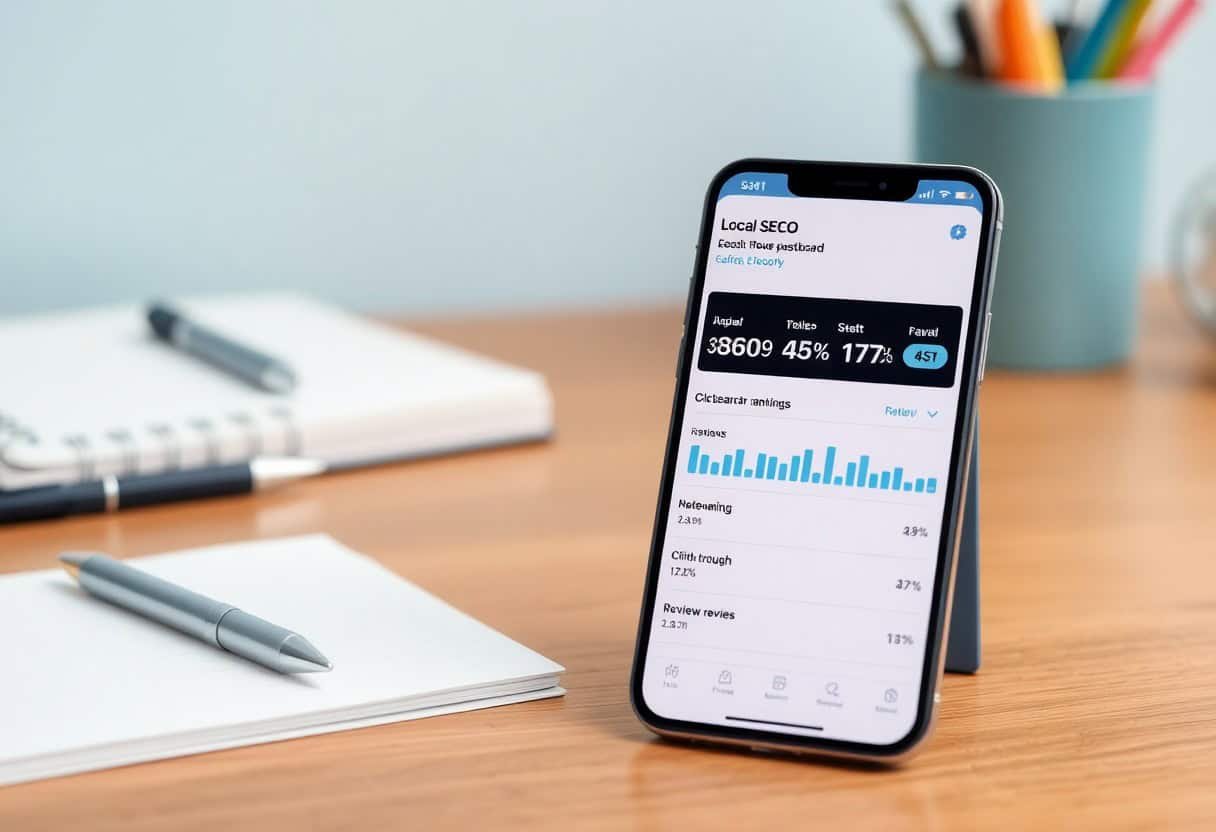You need to track specific key performance indicators (KPIs) to gauge your local SEO success effectively. Monitoring metrics such as organic traffic, local search rankings, conversion rates, and Google My Business insights will provide valuable insights into your online visibility and engagement. Understanding these KPIs helps you adjust strategies and focus on what drives the most benefit for your local presence. This post will guide you through the important KPIs to watch, ensuring your local SEO efforts yield optimal results.

Key Takeaways:
- Focus on local search rankings to assess visibility in local search results.
- Track organic traffic from local searches to evaluate the effectiveness of SEO efforts.
- Monitor online reviews and ratings, as they significantly impact local search credibility and user trust.
The Crucial Metrics for Local Visibility
Understanding the metrics that drive local visibility helps you make informed decisions. By closely monitoring your performance in local searches, you can identify opportunities for improvement and ensure that your business stands out in a competitive landscape. This section highlights key metrics that play a vital role in enhancing your local presence.
Google My Business Insights
Google My Business Insights provides valuable data on how customers interact with your listing. You can track actions such as views, clicks, calls, and direction requests, which reflect the effectiveness of your profile. Analyzing these metrics enables you to optimize your GMB strategy and improve customer engagement, ultimately leading to more foot traffic and conversions.
The Impact of Local Listings Accuracy
Ensuring your local listings are accurate is vital for maintaining a strong presence in local search results. Inconsistent information across various platforms can lead to confusion for potential customers and negatively impact your ranking. Businesses with up-to-date and consistent data are more likely to gain trust, leading to higher click-through rates. Consistency is key; for instance, NAP (Name, Address, Phone) discrepancies can reduce your visibility by up to 40%, hampering your local SEO efforts.
Engagement Metrics that Matter
Monitoring engagement metrics gives insight into how users interact with your local business online. Metrics such as click-through rates (CTRs) and user interaction signals indicate the effectiveness of your SEO strategies. High engagement levels often translate to improved rankings and visibility, leading to increased foot traffic and conversions. Focusing on these metrics will help you understand your audience better and tailor your approach to meet their needs.
Click-Through Rates and Their Implications
Click-through rates (CTRs) reflect the percentage of users that click on your website link from search engine results. A higher CTR indicates compelling titles and meta descriptions that resonate with your target audience. For instance, optimizing your listing with local keywords can elevate your CTR by up to 30%, directly influencing your rankings on search engines.
User Interaction Signals
User interaction signals assess how visitors engage with your site after they click through. Metrics like bounce rate and average session duration reveal whether users find your content valuable. Engaging content keeps visitors on your site longer, boosting your authority in the eyes of search engines.
For example, if users consistently spend over three minutes on your site and navigate through multiple pages, search engines interpret this as a positive interaction signal, enhancing your local rankings. Additionally, low bounce rates often indicate users are satisfied with their search results, further reinforcing the need for quality content and responsive design tailored to local search intent.

Track Reviews and Their Influence
Monitoring customer reviews plays a pivotal role in local SEO success. Reviews not only impact your online reputation but also contribute to your visibility in search results. Search engines like Google consider review quantity and quality as significant ranking factors. Regularly tracking your reviews enables you to respond promptly and address customer feedback, enhancing your engagement and improving your brand image.
The Power of Customer Opinions
Customer opinions shape perceptions and drive decisions. Potential clients often rely on reviews as social proof, influencing their choice before engaging with your business. Positive reviews can boost your credibility and attract more foot traffic, while negative ones may deter potential customers. Gathering and showcasing authentic feedback enhances your trustworthiness in your community.
Quantity vs. Quality of Reviews
Both quantity and quality of reviews hold weight in your local SEO strategy. A high volume of positive reviews signals authority, but the content also matters. Genuine, detailed reviews are more impactful than numerous vague endorsements. A single five-star review that thoroughly describes a positive experience can resonate more with potential customers than twenty one-line ratings.
Striking a balance between quantity and quality is necessary for maximizing your local SEO performance. For instance, accumulating many five-star reviews is beneficial, but if they lack meaningful narratives, their effect diminishes. Engaging customers and encouraging them to provide comprehensive feedback can help elevate your rankings. Even addressing negative reviews constructively can showcase your commitment to customer satisfaction, ultimately nurturing a loyal client base that prioritizes quality interactions. Aim for authentic, descriptive reviews that highlight specific aspects of your service or product, which often yield better outcomes for both your brand reputation and search visibility.
The Role of Local Keywords in Performance
Local keywords serve as the foundation for your local SEO strategy, guiding potential customers to your business. Integrating specific location-based terms into your content can boost visibility in local searches. For instance, using phrases like “best coffee shop in [Your City]” can help you rank higher for users searching for services or products in your area. This targeted approach ultimately leads to enhanced organic traffic and increased customer acquisition.
How Keyword Ranking Affects Traffic
Your keyword ranking plays a direct role in your website’s traffic. Higher rankings for local keywords can significantly increase click-through rates, leading to more visitors. For example, businesses that rank on the first page of search results enjoy over 70% of organic clicks. By optimizing for the right local keywords, you ensure that your business is visible to those actively seeking your services, translating to higher foot traffic and online inquiries.
Tools to Monitor Keyword Success
Utilizing tools to monitor keyword success allows you to track how well your local SEO efforts are performing. Platforms like Google Search Console and SEMrush can provide insights into how your targeted keywords rank, along with search volume and traffic data. Regularly analyzing this data helps you adjust your strategy, focusing on high-performing keywords while identifying opportunities for improvement.
Google Search Console provides important performance metrics, such as impressions and clicks for specific queries. SEMrush offers more in-depth analysis, including competitor keyword tracking and suggestions for alternative keywords to enhance your strategy. Additionally, tools like Ahrefs can reveal backlink profiles influencing keyword rankings, while Moz helps monitor on-page SEO factors. Leveraging these tools empowers you to continuously refine your local SEO approach, ensuring sustained progress and visibility in search results.
Analyzing Competitor Performance
Assessing competitor performance is vital to refine your local SEO strategy. By examining how rivals rank in search results, their online visibility, and customer engagement, you can identify strengths and weaknesses. Tools like SEMrush or Ahrefs can provide insights into competitors’ keywords, backlinks, and content strategies, allowing you to adjust your approach and make informed decisions in your local market.
Benchmarking Against Local Rivals
Benchmarking against local rivals helps you gauge your performance within the community. Analyze key metrics like local search rankings, website traffic, and social media presence. Comparing these statistics with those of your competitors reveals opportunities for improvement. Look for trends in their strategies that drive engagement and consider how you can adopt similar tactics or innovate beyond their methods.
Strategies to Gain Competitive Advantage
To gain a competitive advantage, focus on unique selling propositions that differentiate your business. This could involve enhancing customer service, optimizing your website for better user experience, or creating localized content tailored to your audience’s specific needs. Implementing proactive community engagement through events, partnerships, and local sponsorships can also strengthen your brand presence and loyalty.
Delving deeper into strategies for gaining a competitive edge, consider leveraging local SEO tactics such as creating compelling, local-focused content that highlights your business’s connection to the community. For instance, publishing blog posts about local events or using local dialects in your marketing material can resonate more with customers. Utilize Google My Business features to share timely updates and customer testimonials, ensuring your business appears as a relevant choice in local searches.
Summing up
Upon reflecting, tracking the right KPIs is crucial for your local SEO success. Focus on metrics like local search rankings, organic traffic from local queries, click-through rates on local listings, and customer engagement on your Google Business Profile. Additionally, monitor conversion rates and customer reviews, as they significantly impact your visibility and reputation. By keeping a close watch on these indicators, you can make informed adjustments to your local SEO strategies and enhance your overall performance in search results.
FAQ
Q: What are the most important KPIs for tracking local SEO success?
A: Key Performance Indicators (KPIs) to monitor include local pack rankings, organic traffic from local searches, the number of online reviews, click-through rates from local listings, and conversion rates from local search visitors.
Q: How can I measure the performance of my local search listings?
A: You can measure performance through Google My Business insights, which provide data on searches, views, and actions taken by users. Additionally, monitor the number of calls, direction requests, and website visits generated from your listing.
Q: Why is it important to track online reviews as a KPI for local SEO?
A: Tracking online reviews is important because they impact your local rankings, customer trust, and conversion rates. Higher volumes of positive reviews can enhance visibility in local search results and improve user engagement.

